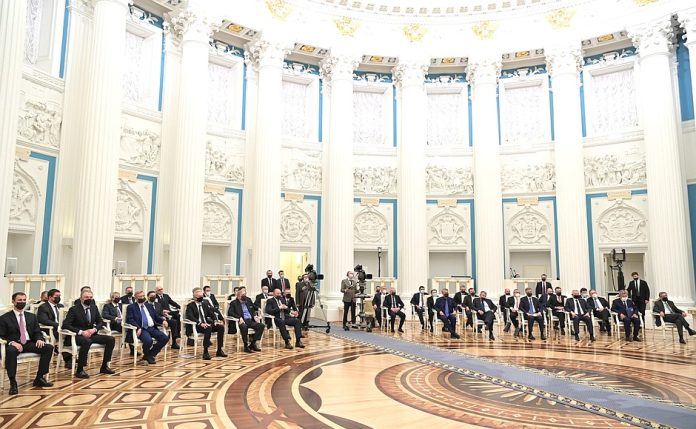Some restrictions against Russian businessmen are now viewed as counter-productive
March marks a year since the European Union started restricting trade with Russia and imposed sanctions against the country’s “oligarchs” and businessmen. The idea behind sanctioning individuals was to put pressure on the elite and create a division that would convince Vladimir Putin to stop hostilities in Ukraine.
The results of the restrictions have been mixed. The economic sanctions have the potential to hurt Putin’s economy, while they’ve already exacerbated problems with energy supplies and inflation for the EU itself. Meanwhile, personal sanctions against private business owners and CEOs have failed to achieve their goal. Moreover, Vladimir Putin is trying to get these businessmen on his side by claiming that Europe is robbing them and taking away their legally earned funds.
The grounds on which the individual sanctions were imposed were weak to begin with. The EU chose its sanctions targets based on information on social media about the participants of Vladimir Putin’s meeting on February 24, 2022, the day he launched the invasion in Ukraine. The EU randomly sanctioned 24 out of 37 meeting participants. The meeting, however, was merely a routine gathering on economic issues organized by the Russian Union of Entrepreneurs and Industrialists. It had been planned several weeks in advance its participants were unrelated to foreign policy or the war in Ukraine.
Outlets such as the Financial Times and the Wall Street Journal labelled the participants of that meeting as “oligarchs”, referring to businessmen with political influence. The concept, however, reflects a deep misunderstanding of the contemporary Russian reality by western countries.
The stereotype of the Russian oligarch comes from the 1990’s, when so called “state capture” allowed oligarchs to exert nearly unlimited power over former- President Boris Yeltsin’s government. At the time, oil was cheap, the budget revenues were low, and the owners of private banks (the notorious “Seven Bankers”) would offer the government “loans for shares” and engage in other murky privatization schemes to gain control over the largest Soviet-era enterprises. In turn, they helped Yeltsin get re-elected in 1996, a move that displayed their ultimate authority over politics.
When Vladimir Putin came to power in 2000, however, he made it clear that he, and not the “oligarchs”, would be in charge. In 2001, he nationalized the private television channel NTV and in 2003, he imprisoned one of the most powerful oligarchs, the head of the Yukos oil company Mikhail Khodorkovsky, exhibiting what can happen to whoever tries to overstep the boundaries of politics and private interests. As a result, Russia no longer has oligarchs in the literal sense of the word, meaning businessmen with heavy political influence. Today, the country’s elite is divided into two groups: the former-oligarchs who made their wealth in the 1990’s but no longer have political influence, and the businesspeople, who consist of a newer generation of western-oriented CEOs and leaders.
The former oligarchs, who tend to be connected to the state, include individuals like Vladimir Potanin, Norilsk Nickel’s largest shareholder and CEO, and Mikhail Fridman, who once co-owned TNK-BP oil company with his partners. Others loyal to Putin include his personal circle from St. Petersburg like Arkady Rotenberg, Yuri Kovalchuk and others.
The newer generation of businessmen differ from the former-oligarchs and from Putin’s circle since they weren’t involved in the controversial privatization of the 1990s, have no relations to the Kremlin and are not dependent on state money. Coal and fertilizer tycoon Andrey Melnichenko is an example.
This group also includes CEOs of private companies including Tigran Khudaverdyan of technology firm Yandex, Dmitry Konov of petrochemical producer Sibur, Vladimir Rashevsky of fertilizer maker Eurochem and Alexander Shulgin of online marketplace Ozon and others. The mentioned CEOs were placed on European sanctions lists and subsequently stepped down from their position to reduce the risk for their companies.
These people are far from the status of “oligarchs” and never had personal access to Putin. Moreover, corporate governance studies show that CEOs have very limited influence in Russia, since it is the business owners tend to have the final say in making strategic decisions. Russian CEOs are senior white-collar employees and technocrats, but they are also the ones who modernized Russian companies and facilitated cooperation with international firms. They can be distinguished by their western-oriented mentality (many of them also studied in European business schools) and by their connections among foreign counterparts.
These modern CEOs who make up the new generation of Russian businessmen with modern mindset are perhaps the last remaining link between Russia and the world outside. Alienating them with almost irreversible sanctions is not only futile, but dangerous since it eliminates any chances for Russia’s peaceful reintegration and collaboration with the international community in the future. Sanctions should be applied to those who are helping to violate Ukraine’s territorial integrity, not to those who have the potential to advocate for it in the future.

